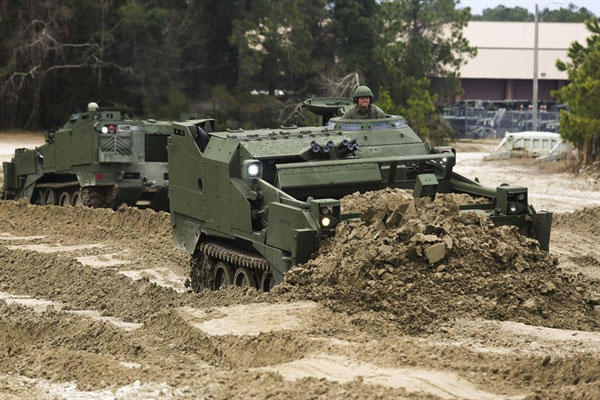PANAMA CITY, Fla. -- The Marine Corps Systems Command Combat Support Systems (MCSC CSS) and Naval Surface Warfare Center Panama City Division (NSWC PCD) M9 Armored Combat Earthmover (ACE) engineers delivered four modernized M9 ACE production units to the U.S. Marine Corps, Feb. 28.
According to NSWC PCD M9 ACE Project Engineer Jeff Dinges, the first modernized units were delivered specifically to the 2nd Combat Engineer Battalion at Camp Lejeune, North Carolina.
"There will be a total of 101 Modernized M9 ACE's delivered to the United States Marine Corps by the end of Fiscal Year 2015," said Dinges.
Dinges said this has been the first major upgrade to the Marine Corps M9 ACE since 1993. The M9 ACE is a fully tracked armored combat engineer vehicle, operated by one engineer equipment operator, and provides combat engineering support to front-line Marine forces.
"To be an M9 ACE operator is earned, not given," said 8th Engineer Support Battalion's Marine Sergeant Anthony Queisser. "An M9 ACE operator is alone, unarmed and unafraid."
The Marines, who depend on it to breach obstacles and clear the way for their troops, claim it is now capable of functioning more efficiently than ever before.
"When the Marines penetrate areas that appear impassable, it is the mission of the M9 ACE operator to clear all obstacles, reconstruct terrain, breach berms, prepare anti-tank ditches, prepare access routes at water obstacles and create roads, so our forces can breach these areas to complete their missions," said Dinges.
According to Dinges, the M9 ACE, a vehicle once plagued with mechanical issues originating back to the 1980's, increasing the M9's Reliability, Availability, and Maintainability (RAM), is his engineering team's objective.
"The M9 ACE breaches obstacles often constructed by our adversaries. Now that it's been modernized, there is less of a delay for troop movement by having an ACE out in front," said Queisser. "And when you're under enemy fire, every second counts."
"The Modernized M9 ACE is a significant improvement over the legacy M9 ACE," said Dinges.
The vehicle's recent improvements include an entire redesign of the hydraulic subsystem, incorporation of an automated track tensioning system, a redesign of the electrical subsystem, design and integration of a vision system consisting of ten cameras, the addition of an automated fire extinguishing system, and incorporating improvements from the Army's Standard Improvement Package-4 (SIP-4).
Dinges said that his team started off with a major subsystem replacement to improve the vehicle's reliability.
"After a year of building six low-rate production vehicles and over two years of RAM testing, we were able to improve other areas of the vehicle beneficial to both the operator and maintainer. From the engineering standpoint, we never want to stop improving the product, so we squeezed every last second out of the program schedule to get the Marines the best product possible," said Dinges.
Queisser said the modernization has made a marked difference in the vehicle's overall performance and responsiveness.
"The ACE's hydraulic system is much more capable of operating without failure," said Queisser. "The integrated vision system adds a whole new level of improved visibility. Now there are cameras and lights that surround the ACE and the infrared cameras allow us to see through clouds of dirt and dust, including the ability to see at night. The newer cameras link to screens inside the operator's cab for enhanced visibility, which brings our visibility factor from about 180 degrees, with the hatch closed, to approximately 360 degrees."
Dinges and his engineering team also developed a new computer-based troubleshooting aid that uses a 3-D model of the M9 ACE and its subsystems to help operators and maintainers learn about the vehicle, find part information, and troubleshoot subsystem problems from their computer.
"We spent two years on the computer based troubleshooting aid's design," said M9 ACE Electrical Engineer Daniel Coats. "This tool provides a faster and more user-friendly way to help operators and maintainers solve problems."
"We are very excited to be fielding this modernized upgrade," said Dinges. "After several years of development and testing, we met our objectives of delivering a vehicle that improves the Marines ability to perform their task. "It was a team effort between NSWC PCD, the USMC program office in Quantico, Va., the USMC Production Plant in Albany, Ga., the Aberdeen Test Center in Aberdeen, Md., and our team of vendors from all over the country. We would not have been able to achieve the level of success we did without efforts that went above and beyond from everyone on the M9 ACE team."
Marine Corps Systems Command's Combat Support Systems Product Manager Joseph Klocek said objectives achieved with this particular modernization effort have surpassed all previous upgrades.
"Our objective was to improve the reliability of the M9 ACE and the capability that it provides the Marine Corps' Operating Forces," said Klocek. "NSWC PCD's M9 ACE Engineering Team was critical in providing technical solutions to meet these objectives. This program is quite a success. The M9 ACE team achieved this task within cost constraints, on schedule, and is delivering to America's warfighter the most reliable and dependable modernized version of the M9 ACE fielded to date."


























